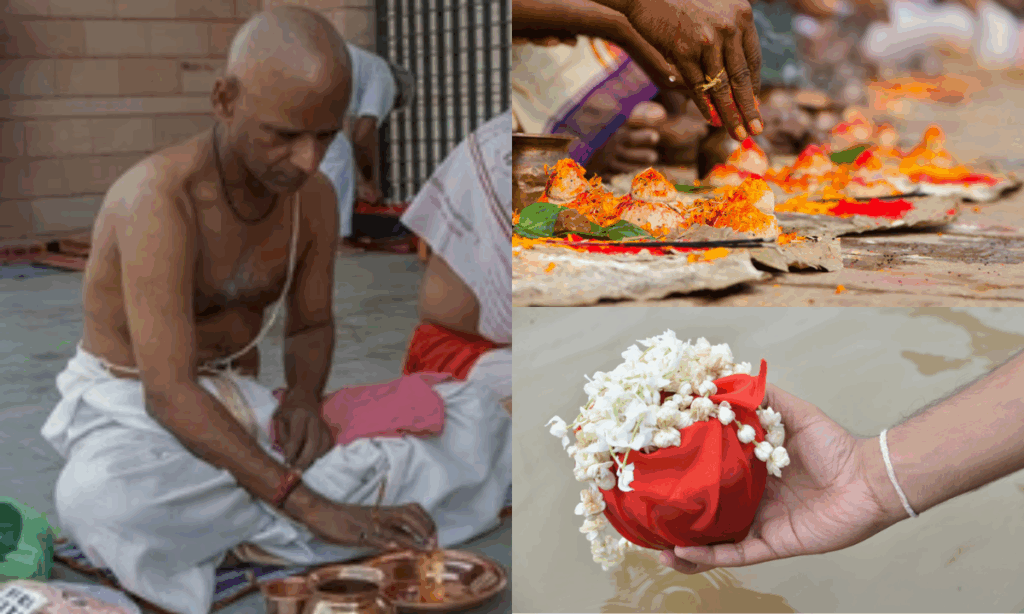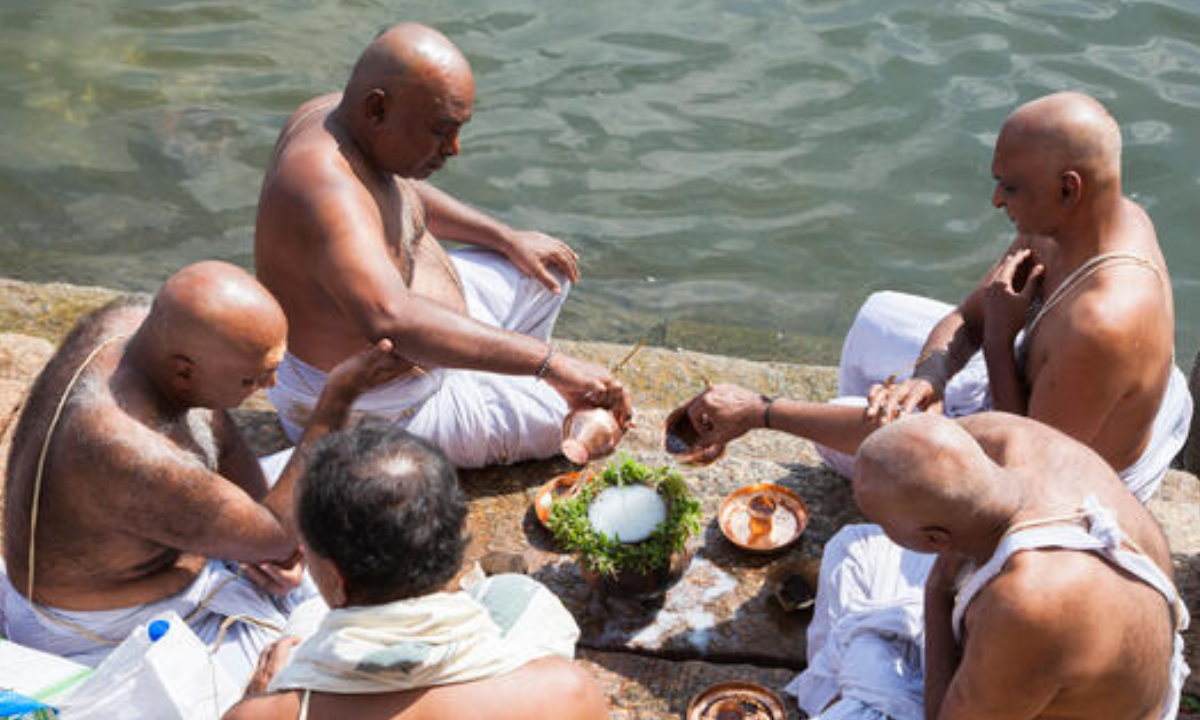After death rituals hold a sacred place in our culture and traditions. These ceremonies are not only religious practices but also emotional anchors that provide families with strength, closure, and peace during the most difficult moments of life. They represent respect, gratitude, and spiritual support for the departed soul as it begins its onward journey to the ancestral world.
In this blog, we will explore the meaning of after death rituals, the detailed process, and why they are significant for families. We will also look at specific ceremonies like the after death 11th day ceremony, the 13th day after death ceremony, and the shraddha ceremony after death. And towards the end, we will share something that many families tend to overlook but can make the entire journey much smoother.
What are After Death Rituals?
After death rituals are a set of religious, cultural, and spiritual practices carried out immediately after a person passes away and continue for several days. These ceremonies are performed under the guidance of a pandit and considered essential because they help the departed soul find peace, allow the family to express love and respect, and provide a structured way for relatives and community members to grieve together.
From the time of cremation to the ceremonies performed on the 11th or 12th day, each step has deep symbolic and spiritual significance. These rituals have been followed for generations, not only to guide the soul but also to help the living cope with loss in a meaningful and structured way.
The Process of After Death Rituals

The process usually begins with cremation and continues through several ceremonies. The exact rituals may vary depending on the family’s faith, tradition, and regional customs, but the broader steps remain quite similar across many communities in India.
Step 1: Cremation
The journey begins with cremation, where the body is respectfully reduced to ashes. Families may choose a traditional wood pyre at a cremation ground, or an electric cremation at modern facilities such as the Harishchandra Ghat Electric Crematorium in Bangalore. Both options are treated with dignity and are equally accepted from a ritualistic perspective.
Step 2: Collection of Ashes
The ashes are carefully collected in an urn, usually on the same day or the following morning. These ashes are later immersed in a holy river or sacred water body (Asthi Visarjan), symbolising the return of the body to nature and the release of the soul from earthly bonds.
Step 3: Daily Rituals
For the next ten days, prayers and offerings are made for the departed soul. Families often light lamps, prepare food offerings, and recite mantras to give spiritual strength to the soul on its journey. These daily observances also allow family members to come together in remembrance.
Step 4: The 11th Day Rituals
The after death 11th day ceremony is considered one of the most significant milestones. On this day, special prayers and offerings are made to mark the purification and release of the soul from earthly ties. It is believed that this ceremony helps the soul progress towards the ancestral world.
Step 5: The 12th Day Ceremony
The 12th day after death ceremony signifies the acceptance of the soul among the ancestors. It also marks the end of the immediate mourning period, after which the family slowly begins to resume normal life. This step provides both spiritual closure for the soul and emotional closure for the family.
Step 6: Shraddha Ceremony
Later, the shraddha ceremony after death is performed annually or on specific lunar dates to honour and remember the departed soul. This ceremony expresses gratitude, ensures blessings from ancestors, and strengthens the bond between generations.
Why are After Death Rituals Important?
The importance of these rituals goes far beyond tradition. Spiritually, they are believed to guide the soul safely into the next world and help it achieve peace. Emotionally, they give grieving families structured opportunities to express sorrow, respect, and love while finding closure in a supportive way.
Culturally, these rituals serve as a means of passing on values, traditions, and beliefs to the younger generation, ensuring continuity. They also strengthen community ties, as relatives, friends, and neighbours come together to offer both emotional and practical support during mourning.
Tip: While rituals can feel overwhelming during grief, seeking guidance from organised cremation services in Bangalore can ease the burden. These services help manage arrangements with dignity and respect so the family can focus on prayers and healing.
Key Rituals at a Glance
Here’s a simplified table to understand the timeline of after death rituals:
| Day | Ritual | Significance |
|---|---|---|
| Day 1 | Cremation | The soul begins its onwards journey. |
| Day 2–10 | Daily prayers and offerings | Strengthen the soul’s transition and provide peace. |
| Day 11 | 11th day ceremony | Marks purification and release of the soul. |
| Day 12 | 12th day ceremony | Soul is welcomed among ancestors; the mourning period ends. |
| Annual | Shraddha ceremony | Continuous remembrance and honouring of the departed. |
Practical Tips for Families
- Plan Ahead: Discussing preferences for rituals in advance can reduce confusion and stress later.
- Seek Guidance: Priests and elders in the family can provide clarity about specific customs and traditions.
- Professional Help: Organised cremation services can handle logistics like bookings, priests, and ritual materials.
- Personal Touch: Adding the favourite flowers, songs, or food of the departed can make the ceremonies more meaningful.
Final Thoughts
After death rituals are not just about following tradition; they are acts of love, respect, and sacred responsibility. From the after death 11th day ceremony and 12th day after death ceremony to the shraddha ceremony after death, every step reflects care for the soul and comfort for the family.
Whether carried out at a traditional cremation ground or at modern facilities like the Harishchandra Ghat Electric Crematorium, these rituals provide spiritual strength and help families cope with loss in a structured way.
We hope this guide has given you clarity on the meaning, process, and importance of these ceremonies. If you ever find yourself in need of compassionate guidance, professional cremation service providers in Bangalore like Kaashimukthi are always there to support you with dignity and care during such sensitive times.
FAQs on After Death Rituals
Q1: Can daughters perform after death rituals?
Yes, daughters today often take an active role in cremation and rituals. What matters most is the sincerity and devotion with which the rituals are performed.
Q2: What happens if the 11th or 12th day ceremonies are missed?
Priests usually suggest performing them as soon as possible. The spiritual intent and devotion behind the rituals are more important than the exact timing.
Q3: Are electric cremations acceptable for rituals?
Yes, electric cremations are increasingly common, especially at places like the Harishchandra Ghat Electric Crematorium. Priests perform the required antim sanskar before and after the process, ensuring spiritual completeness.
Q4: Do families need to organise everything on their own?
Not necessarily. Professional cremation services in Bangalore can handle everything, from booking slots to arranging priests and providing ritual materials, so families can focus on prayers.
Q5: How long do the after death rituals continue?
The main set of rituals typically lasts for 12 days, but remembrance continues through the annual shraddha ceremony, ensuring the bond with ancestors remains alive for generations.

Madhu is an Entrepreneur, a Mentor, a Writer and an Aspiring Car Race Driver. He is Deeply passionate about leveraging Technology and Human Centred Design to make complex care and End of Life Planning easier. With the ultimate aim of Improving the quality of Life in the Twilight years. Madhu is highly educated and Alumni of IIM-Bangalore, Sikkim Manipal University and Bangalore University besides a Rich Industry Experience in the field of Product Management, Design, Supply chain, Finance, Commercial Management and Funeral Services.

